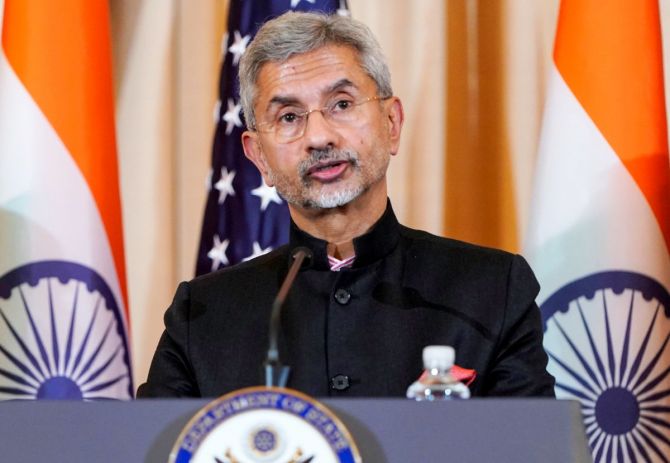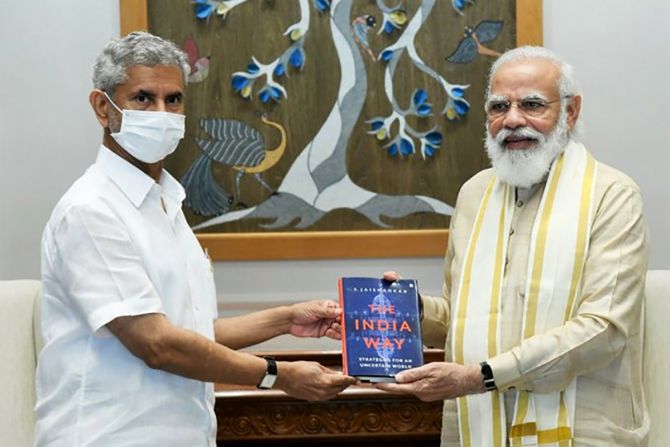If Jaishankar's diagnosis is correct, what stops him from correcting it?
by AAKAR PATEL'What Jaishankar says is simplistic.'
'The past does not matter that much.'
'If we think that it does it is because we are not good enough at running the nation competently today and are searching for excuses why,' argues Aakar Patel.

IMAGE: External Affairs Minister Dr Subrahmanyam Jaishankar speaks to the media after the 2019 US-India 2+2 ministerial dialogue at the State Department in Washington, DC. Photograph: Joshua Roberts/Reuters
India's foreign minister comes from a family of scholars. His father K Subrahmanyam was the founder of the famous think-tank IDSA in Delhi and advised Indira Gandhi.
On the weaponising of India's nuclear programme and on military intervention in Bangaldesh, Subrahmanyam had a hand.
Subrahmanyam's son Sanjay Subrahmanyam, Jaishankar's younger brother, is one of the world's most famous scholars of medieval India. He has written books on commerce in Surat (my home town) and South India as well as on Vasco Da Gama.
My point is that Dr (he is a PhD himself) S Jaishankar has a background which is not the same as our other ministers.
Jaishankar has recently released a book a few days ago that said three things had negatively affected India foreign policy.
The first was Partition, which reduced the size of India and gave China even more important than it was.
The second was the delay in the economic reforms of 1991, which had they come earlier would have made India a wealthier nation earlier than it will become.
And third the delay in choosing to make atomic weapons. He called them the three burdens.
What should we make of what he is saying? We need to examine two separate things, first to see to what extent what he says is true.
India's Partition did reduce the size of the country and if India had not been partitioned, the undivided nation would be larger geographically, stretching from Burma to Iran and with a population of 1.7 billion people.
It would not be particularly different in terms of its economy, per capita income, productivity or any other way.
South Asia has developed together, none of the three countries which were part of British India have either become a developed country and none on the other hand has not succeeded in developing at least a little.
A visit to Pakistan and Bangladesh reveals them to be no different than most parts of India.

IMAGE: External Affairs Minister Dr Subrahmanyam Jaishankar presents a copy of his book, The India Way: Strategies for an Uncertain World, to Prime Minister Narendra Damodardas Modi, August 25, 2020. Photograph: Kind Courtesy S Jaishankar/Twitter
The second issue is the delay in economic reforms. This is not Jaishankar's subject because he is not an economist. So we must be cautious when we accept what he is saying as true.
The Indian economy of Nehru's time had little capacity. State capital was needed as an element, especially in heavy industry. And without the State, the institutions we take for granted, for example in higher education, would not have come at all.
Whatever bhajans we may sing to privatisation there is no private equivalent of the IIT or IIM even today in India.
This is not to say that the license raj of Indira Gandhi was a good thing. It was not. The best we can offer Jaishankar's statement on the delay in reforms is a qualified yes, not a full endorsement.
The third is the exercise of the nuclear option, which happened in May 1974. India makes a big deal of having an atom bomb. It is not such a big deal. Many nations in South America, Europe, Asia and Africa had the capacity to make one, but choose not to.
The other thing is that India violated its foreign commitments to make the bomb. The reactors producing the material used in our bombs came from Canada whom we had promised that we would only use nuclear technology for peaceful purposes (this is why Indira Gandhi made the claim that the 1974 was a 'peaceful explosion').
We have held these weapons for 45 years now. How have they helped us? We cannot use them against Pakistan which for 30 years we have accused of terrorism.
We cannot use them against China which is today inside our borders. It is debatable that the early weaponising of our programme could have helped us in any way.
Jaishankar calls these three things 'burdens' and he lays them at the Congress's door. Let us see what his party has done and is doing.
India may have been partitioned, but its Pakistan and Bangladesh are still next to us. They have not been relocated to Africa.
What stops India from unifying the subcontinent through trade or travel? It is our nationalism. We have free movement (without visas) with Nepal, but not with Bangladesh.
Why? We could unify South Asia with visa free travel and trade if we chose to. The BJP does not want it.
The assumption Jaishankar makes about liberalisation automatically producing economic growth is false.
Under the BJP, India's economic growth has been declining since January 2018 according to its own figures.
That is two-and-a-half straight years of decline in six years of government. This did not happen during Socialism or license raj.
This year we will see a contraction of the economy. Mere liberalisation does not mean economic growth.
What Jaishankar says in his three points is reductive and simplistic. The past does not matter that much.
If we think that it does it is because we are not good enough at running the nation competently today and are searching for excuses why.
If Jaishankar's diagnosis is correct, what stops him from correcting it today? His book does not say that. Perhaps that will come in a future book.
Aakar Patel is a columnist and writer.
You can read Aakar's columns here.
Feature Presentation: Rajesh Alva/Rediff.com